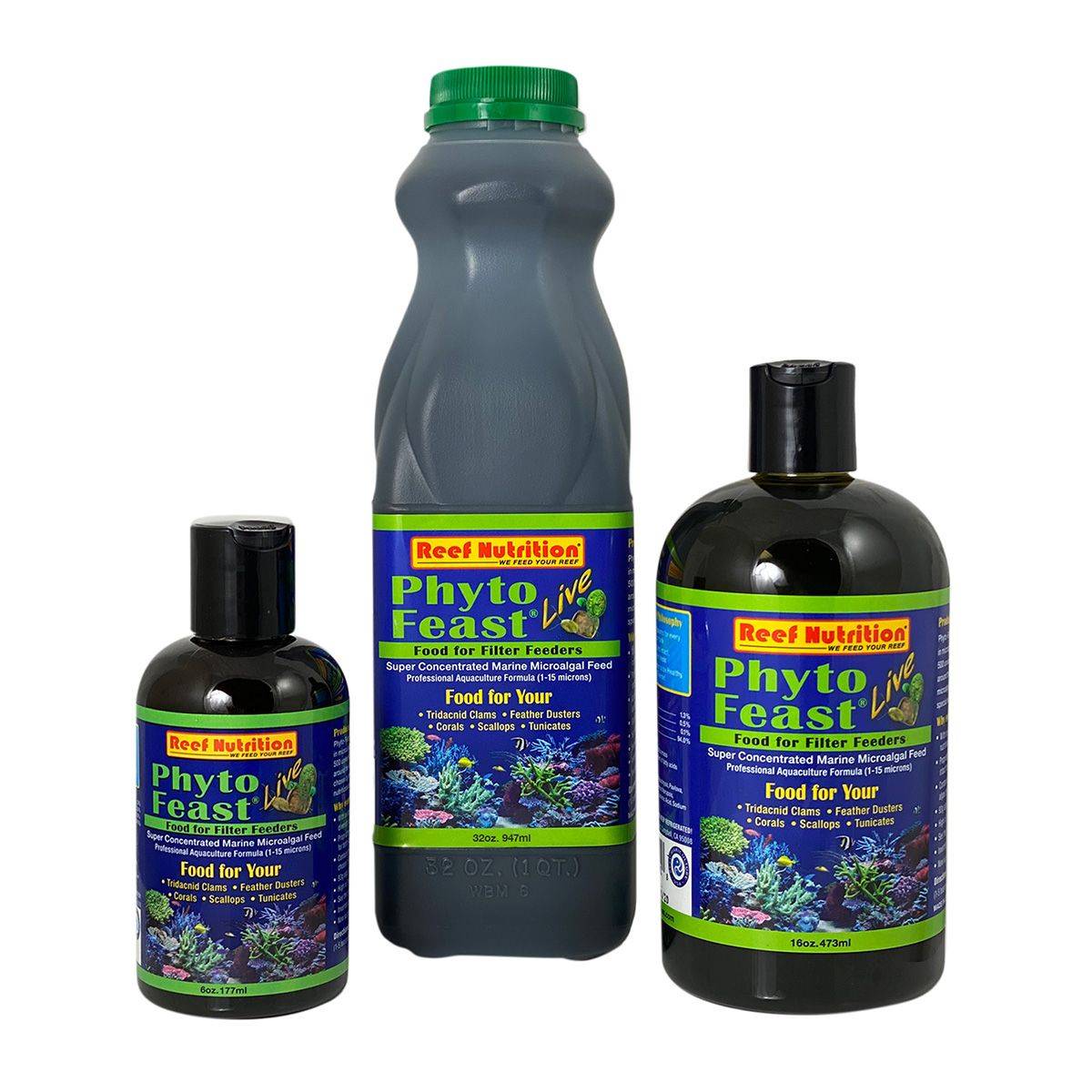Everyday low prices. Free Shipping Over $249. Or $29.99 Flat Rate Over $100
Phyto Feast Live
$ 14.99
Please select all options.
What are phytoplankton and why are they important in a Reef System?
Phytoplankton are single cell microalgae that exist primarily in the water column. Microalgae is the beginning of the marine food chain and the primary source of essential nutrients for most reef filter feeders. Filter feeders that rely directly on phytoplankton include bivalves like clams, scallops, mussels, and oysters, as well as many corals, feather dusters, sponges, ascidians and zooplankton like rotifers and copepods.
It was once thought that most reef animals do not require microalgae, however, we have learned in recent years that nearly all reef animals that can filter feed do rely on plankton for an essential portion of their diet. This is even true for animals that can use zoozanthellae and photosynthesis for nourishment. With hindsight, this is obvious as zoozanthellae only contribute carbohydrates to the host animal, requiring the animal to look elsewhere for lipids, protein, vitamins and other nutrients.
In nature, filter feeders rely on a mix of diatoms, golden-brown, green, yellow-green, blue-green and red microalgae for a nutritionally complete diet. These life forms may look similar, but they are so ancient that they have incredible biological and nutritional diversity. Biologically speaking, there is vastly more difference between a green algae and a golden-brown flagellate than between dandelion and a fir tree.
Will microalgae add phosphate and nitrate to my system?
Yes - in very small amounts. There are no added phosphate and nitrates in Phyto-Feast, however these are critical components of all plants so it's impossible for any microalgae product not to contain some amount. If you have a refugium with some seaweed (Macro-Feast), the seaweed should help pull some of the P&N out of your system. If you experience elevated phosphates there are many products on the market to help lower them, such as Granular Ferric Oxide (GFO).
Phyto-Feast will add much less phosphate and nitrate than algae you grow at home. The algae in Phyto-Feast is separated from the growing media during harvesting, so the only P&N is the small amount actually in the cells, not the media.
There is also a very good article about this by Eric Borneman at reefkeeping.com.
Why is a complete Omega-3 fatty acid profile important?
Omega-3 fatty acids (EPA, DHA, and ARA) are considered essential fatty acids, which means that they are essential to animal health but cannot be manufactured by animals. For this reason, Omega-3 fatty acids must be obtained from food. Omega-3 fatty acids can be found in fish and certain plant oils, especially marine microalgae. Also known as polyunsaturated fatty acids (PUFAs), Omega-3 and omega-6 fatty acids play a crucial role in brain function as well as normal growth and development.
Different algae can be very different in their Omega-3 fatty acid content. Some, such as Chlorella, contain no EPA or DHA. So it is very important to feed your tank a mixture of carefully chosen algae species for complete and balanced nutrition. The algae in PhytoFeast were specially selected to provide high levels of EPA, DHA and ARA.
Will Phyto-Feast decompose and foul my system?
No. Phyto-Feast cells are intact and not broken so bacteria cannot quickly break them down and cause them to decompose.
Do I need to worry about bacteria or algae blooms if I use Phyto-Feast?
Typically No. Bacterial blooms are typically caused by significant amount of uneaten biomass remained in your system for several days due to overfeeding. Please adhere to the feeding instructions on the bottle to minimize the likelihood of this happening. When first using Phyto-Feast, we recommend you begin at the lowest recommended level and increase as your tank becomes accustomed to the new feed.
Your protein skimmer will likely remove any excess Phyto-Feast from your system.
Which of my animals will feed on Phyto-Feast products?
Some soft corals, sponges, tunicates, gorgonians, sea fans, Basket and Feather Stars, Clams, Mussels, Barnacles, Feather Dusters and Tridachnid clams.
Category: 10-25, 25-50, Reef Nutrition, vivid-aquariums
Type: Dry Goods


